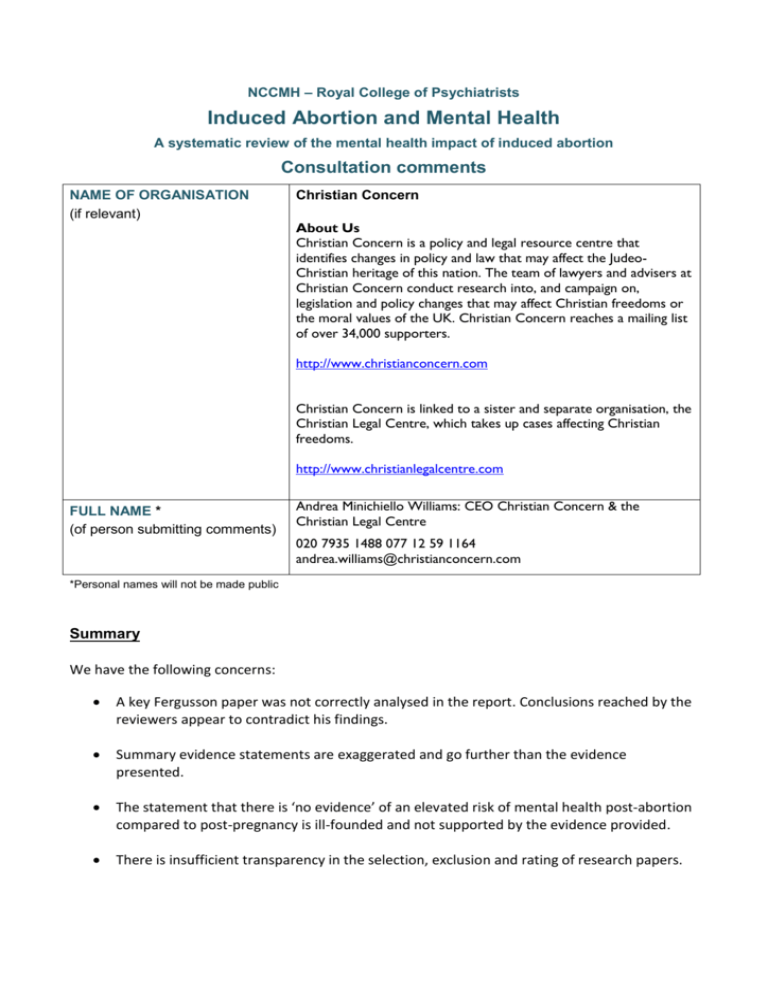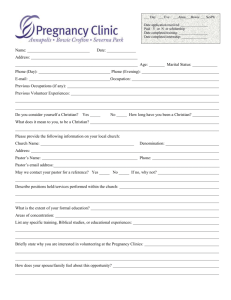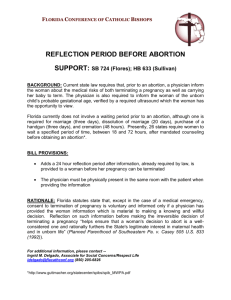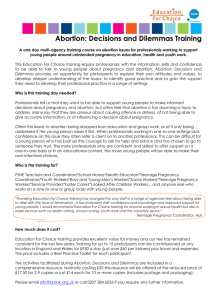Induced Abortion and Mental Health
advertisement

NCCMH – Royal College of Psychiatrists Induced Abortion and Mental Health A systematic review of the mental health impact of induced abortion Consultation comments NAME OF ORGANISATION (if relevant) Christian Concern About Us Christian Concern is a policy and legal resource centre that identifies changes in policy and law that may affect the JudeoChristian heritage of this nation. The team of lawyers and advisers at Christian Concern conduct research into, and campaign on, legislation and policy changes that may affect Christian freedoms or the moral values of the UK. Christian Concern reaches a mailing list of over 34,000 supporters. http://www.christianconcern.com Christian Concern is linked to a sister and separate organisation, the Christian Legal Centre, which takes up cases affecting Christian freedoms. http://www.christianlegalcentre.com FULL NAME * (of person submitting comments) Andrea Minichiello Williams: CEO Christian Concern & the Christian Legal Centre 020 7935 1488 077 12 59 1164 andrea.williams@christianconcern.com *Personal names will not be made public Summary We have the following concerns: A key Fergusson paper was not correctly analysed in the report. Conclusions reached by the reviewers appear to contradict his findings. Summary evidence statements are exaggerated and go further than the evidence presented. The statement that there is ‘no evidence’ of an elevated risk of mental health post-abortion compared to post-pregnancy is ill-founded and not supported by the evidence provided. There is insufficient transparency in the selection, exclusion and rating of research papers. Methodology and Research We have several concerns in relation to the evidence used and the manner in which it has been presented. Firstly, only research which demonstrated the effects of abortion on women more than 90 days after the termination of the pregnancy had been used. This restriction ignores the fact that women have been shown to suffer mental illness in the two months immediately following an abortion. The wealth of evidence illustrating this fact has been completely excluded. Secondly, the study designs used in this review only demonstrate association, they cannot prove causality. This is particularly important when there are powerful confounders (for example, socioeconomic factors, supportive relationships, previous mental health illness, previous abortions etc), which could be mitigating factors. The findings are therefore based on weak and often uncertain evidence, which should be more clearly reflected in the evidence statements. Thirdly, the report is quick to conclude that there is “no evidence” that abortion increases the risk of mental health problems whist the evidence presented did not support this proposition, and was largely vague and unclear on the issue. The analysis should have emphasised that the evidence is uncertain rather than stating that there is “no evidence” at all. The report has also failed to include papers which have been published in languages other than English, and has also excluded hundreds of papers on the grounds that they were not “useable”. However, no indication was given as to what criteria were used to decide which papers were “useable”, which suggests that the report is impartial. As data extraction tables have not been included, readers cannot verify the evidence by comparing the data with the original reports. Evidence can come in many forms. The views and experiences of women, clinicians and other experts should be consulted, along with statutory organisations and relevant Royal Colleges. Qualitative studies should have a place in the review, especially given the limitations in the current data. Methods to seek the views and experiences of those involved in the care of women who have had an abortion should also be considered as a valid source of evidence. PAGE number LINE number 27 SECTION number COMMENTS Please insert each new comment in a new row Specific Points: Question 1, p27. The findings presented in Table 4 (p34-36) are important and cannot be ruled out as they clearly illustrate that the rate of mental health disorders amongst post-abortive women are generally higher than those who have not undergone abortion treatment at all. The eligibility criteria on page 19 does not account for women who suffer mental health problems post abortion but who do not seek medical treatment. The information as to rate of mental health disorders amongst post-abortive women is therefore not an accurate reflection of the true position. In reality, the rate is likely to be higher. 18 14-16 65 9-11 80 Specific Points: Question 3: The report demonstrates recklessness on part of the authors as two different wordings are used for question 3: P18, line 14-16 “Are mental health problems more common in women who have an induced abortion, when compared with women who deliver an unwanted pregnancy?” P65, line 9-11 “Are mental health problems more common in women who have an induced abortion, when compared with women who delivered a live birth?” Whilst the two concepts are not mutually exclusive, delivering a “live birth” will not always be the same as delivering “an unwanted pregnancy”. Accordingly, both questions are likely to produce different results. Furthermore, the first question necessitates that a woman’s state of mind is identified in terms of whether or not the pregnancy was “wanted”, which makes the question trickier to answer. The second question is simpler and is generally preferred over the first. The reviewers justified reaching a different conclusion from Fergusson’s original report on the basis that “new” evidence had emerged, which required his findings to be re-evaluated in light of these new statistics. However, the report does not indicate what these new figures are, where they were taken from and the means by which they were obtained. The report even fails to outline the specific findings made by Ferguson. This prevents any comparison to be drawn between the two sets of figures. The reviewers should have presented findings from both reports and justified their conclusion. Table 17 on p80 is useful as it compares like with like groups.1 However there is selectivity in the use of this data. It shows weak evidence of a higher risk of anxiety disorder and self-harm outcomes for women post-abortion. It also shows weak evidence of higher risk of psychotic illness for women post-birth than postabortion (although see our comment below on p81, line 37-40 on this evidence). It therefore appears surprising that the authors conclude on the evidence statement on page 81, line 38, that ‘there is no evidence of elevated risk of mental health problems and some evidence of lower rates of psychotic illness for women who have an abortion compared to those who deliver the pregnancy’. This evidence statement is favouring (it cites) only the one outcome that demonstrates a positive effect (post-birth) whilst ignoring the two outcomes that show a negative effect (post-abortion). This statement needs amending for consistency – either there is evidence of risks for both, or for neither. 64 12-15 Evidence Statements for Question 2 (para 4.5) Following the statement on page 64, lines 2-4, that: “When considering prospective studies, the only consistent factor to be associated with poor post-abortion mental health is pre-abortion mental health problems”, it should be pointed out that other factors have also been shown to contribute to mental health problems in post-abortive women, such as distress after abortion (Fergusson’s report). This should be made clear in the report. The term “some suggestion” on page 64, lines 12-15 does not fully reflect the strength of the research findings, and undermines how strong the evidence actually is. Such misleading statements should be avoided so that women at risk can be indentified and poor outcomes avoided. 81 37-40 Evidence Statements for Question 3 (para 5.5): Evidence Statement 1: The statement on page 81, lines 37-40, that there is “some 1 It summarises mental health outcomes of abortion compared with delivery of unplanned/unwanted pregnancies. evidence of lower rates of psychotic illness for women who have an abortion compared with those who deliver the pregnancy” is not an accurate reflection of Gilchrist’s 1995 research findings, which were not as concrete as the statement suggests. Rates of psychosis are exaggerated. The indication that there is “NO evidence of an elevated risk…” is incorrect. This conclusion is in stark contradiction to the research findings which have linked poor mental health with abortion (such as the findings of Fergusson, which demonstrate that mental health disorders are more prevalent amongst postabortive women). In fact, all four studies showed the existence of mental health problems amongst women who have had an abortion. Furthermore, Table 14 also demonstrates higher levels of drug and alcohol abuse and suicide in post-abortive women, when compared to those who continue with their pregnancy. The conclusion that there is “NO evidence” misrepresents the true position and must be amended to reflect research findings. Evidence Statement 3: Statement three at page 81, line 47 again contradicts research findings. Whilst Coleman stated that “women who had an abortion were significantly more likely to receive outpatient psychiatric treatment up to 4 years later”, the conclusion drawn is inconsistent with this statement (p68, line 20). This must be corrected. 89 6.3 P89, 6.3 Conclusion Statements 1. We agree. 2.&3. Abortion does not protect women from mental health disorders after an abortion. 4. We agree that the NICE guidelines will be helpful, however, at the same time we believe that women will require more specific psychological therapies to women who feel regret, guilt, or anger as a result of terminating their pregnancy. Such help is not widely available. 5. We support this. We believe that professionals should be required to inform all women seeking an abortion of the mental health risks involved. Professionals should also be made fully aware of these risks in order to provide effective advice on this issue. Please send completed form to AbortionMH@cru.rcpsych.ac.uk by 5pm on 29 June 2011 Please note: We are unable to accept late comments, comments not on the correct form and more than one set of comments per organisation. Please do not include any material that you would not wish to be made public or personal medical information from which you or anyone else could be identified. You will not receive an individual response but comments will be considered and published on the NCCMH website after publication of the final report, along with responses from the NCCMH. The names of organisations who respond will be made public, but not those of individuals. Where comments are received from individuals or where a significant number of similar comments have been received, they may be grouped by theme and summarised. The College reserves the right not to publish comments where publication is considered by the NCCMH to be inappropriate or unlawful.





